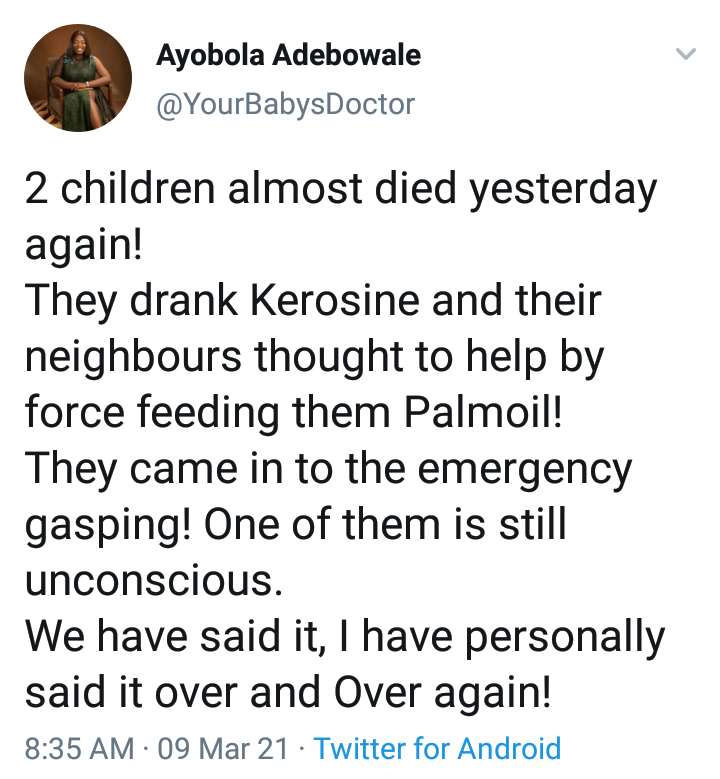Palm oil is not an Antidote for Poisoning
Palm oil is not an Antidote for Poisoning

Palm Oil is Not an Antidote for Poisoning
According to a pediatrician @yourbabysdoctor on Twitter, she said " 2 children almost died yesterday again! They drank Kerosene and their neighbors thought to help by force-feeding them palm oil! They came into the emergency gasping! One of them is still unconscious. We have said it, I have personally said it over and over again!
She continued;
Palm oil is not an Antidote to poisoning! Palm oil if aspirated CAN KILL your child. She advised that when your child takes poison,
1. Check the name of the poison and estimate the quantity size.
2. Rush the child to a hospital and give them the information about the poison taken.
3. Do whatever they tell you to do.
4. Also, Don't force them to vomit (don't put your hands in the throat).
5. Don't give anything them anything to eat or drink.
Someone asked for first-aid treatment tips before taking the child to the hospital.
She advised they remove the remaining contaminant, but not induce vomiting. Different poisons have their peculiarities. Read the instruction on the container (poison) if there is any.
Another person also asked; can activated charcoal help.
She said " In the case of Kerosene and other hydrocarbons. Activated charcoal has no effect, as it doesn't absorb it well.
Some disagree with her and shared their experiences about family or people that took poison or drank Kerosene but were given palm oil and they were fine without visiting the hospital.
Someone said he lost his cousin about 2 years of age because palm oil was given to him when they found out he drank Kerosene.
Essential First Aid Approaches When Kids Ingest Poisonous Substances
Accidental ingestion of poisonous substances is a common concern for parents, as curious children often explore their surroundings. As a responsible caregiver, knowing the right first aid approaches can make a critical difference in such situations. This guide will equip you with valuable information on how to respond promptly and effectively if your child ingests a poisonous substance. By following these steps, you can ensure the well-being and safety of your little one.
How To Respond When Your Child Ingests a Poisonous Substance
Stay Calm and Assess the Situation
In moments of crisis, it's vital to remain calm and think clearly. Assess the situation immediately to determine the severity and identify the substance ingested. If possible, gather any relevant information, such as the product's name or active ingredients, to provide accurate details to medical professionals later. Stay by your child's side, as your presence and calm demeanor will provide comfort and reassurance during this distressing time.
Call Poison Control or Emergency Services
Time is of the essence when dealing with potential poisoning. Contact your local Poison Control Center or emergency services immediately. These professionals possess the expertise to guide you through the situation and provide specific instructions based on the substance ingested. Keep essential information ready, including your child's age, weight, and any symptoms they are experiencing. Follow their instructions carefully while waiting for further assistance.
Do Not Induce Vomiting
While it may be tempting to induce vomiting to remove the poison, this approach is not recommended in all situations. Certain substances, such as corrosive chemicals or batteries, can cause more harm if vomited. It's essential to follow the advice of medical professionals, as inducing vomiting can be appropriate only under specific circumstances. In most cases, it is best to wait for expert advice or professional medical assistance before taking any action.
Remove the Substance from the Reach
If the substance is within your reach and it is safe to do so, carefully remove it from your child's immediate environment. However, avoid putting yourself at risk or exposing yourself to harmful substances. Use gloves or other protective equipment if necessary. Secure the substance in a sealed bag or container, and keep it accessible for medical professionals or poison control personnel who may need to identify it.
Observe and Record Symptoms
While awaiting professional guidance, closely observe your child's symptoms and record them. Note any changes in behavior, signs of discomfort, or physical symptoms, such as vomiting, difficulty breathing, or skin rashes. This information will be invaluable for healthcare providers, aiding in accurate diagnosis and appropriate treatment. Stay vigilant and maintain open communication with medical professionals, providing updates on your child's condition.
Follow Medical Advice and Treatment
Once you have consulted poison control or emergency services, follow their instructions precisely. They will provide you with specific advice tailored to the situation. Be prepared to provide accurate information about the substance ingested, as well as any symptoms your child may be experiencing. Follow-up appointments or additional medical evaluations may be necessary, depending on the severity of the poisoning. Trust the expertise of medical professionals and follow their prescribed treatments or recommendations.
Conclusion
Knowing how to respond effectively when a child ingests a poisonous substance is crucial for any caregiver. By staying calm, contacting the appropriate authorities, and following their instructions, you can provide the necessary first aid while awaiting professional help. Remember, prevention is always better than cure, so ensure that harmful substances are securely stored out of reach, minimizing the risk of accidents. Stay informed, and prioritize your child's safety at all times.
